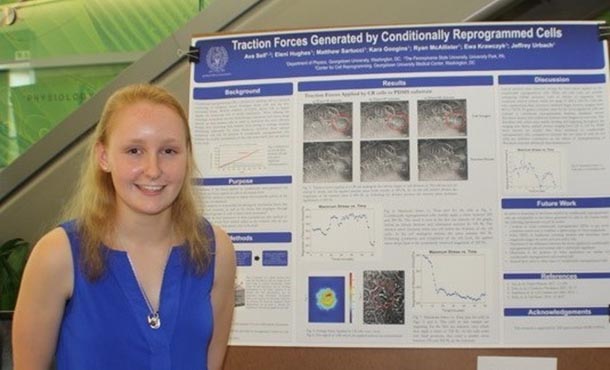
Ava Self, of Warrington, Pennsylvania, earned a 2020 Astronaut Scholarship. IMAGE: PROVIDED
Ava Self earns Astronaut Scholarship
6/4/2020
By Sean Yoder
UNIVERSITY PARK, Pa. — Penn State rising senior Ava Self is a 2020 recipient of the competitive Astronaut Scholarship, which rewards students for their work in the fields of science, technology, engineering and mathematics.
Self, of Warrington, Pennsylvania, is a chemical engineering major and chemistry minor. She is one of 56 recipients of the award from 41 universities across the United States. Astronaut Scholarships are awarded in a student’s sophomore or junior year to be used for research or advancement of their field during their junior or senior year, respectively.
Self’s undergraduate research is conducted under the supervision of Esther Gomez, associate professor of chemical engineering and biomedical engineering. Self said her research focuses on using graphene as a platform for targeted breast cancer treatment.
“The graphene is coated with lipids to make it biocompatible, meaning it can be used within the human body without having any adverse reactions,” Self said. “Therapeutic enzymes can then be bound to the lipids, and this nanoscale device can be targeted to the mitochondria for cancer treatment.”
Though she has earned the Astronaut Scholarship based on her accomplishments as a junior in college, Self said she initially was not sure if she would pursue a graduate degree when she began her undergraduate research. However, she said she quickly became passionate about the work, spurring her to apply for and receive a biofellowship from the Department of Chemical Engineering for summer 2019. This allowed her to work on her research full time.
“I appreciate that research challenges me to learn something new each day and also develops my critical thinking and problem-solving skills,” Self said. “This experience has changed my view of graduate school from a potential future path to an avenue that I am determined to pursue.”
Self said she was surprised and excited when she learned she had earned the scholarship.
“A lot of highly qualified individuals apply for this award, so I am very grateful and blessed to have won,” Self said. “My parents were ecstatic when they learned the news.”
Gomez praised Self for her hard work and dedication.
“Ava is a highly accomplished student who has excelled in academics and research while also being involved in athletics, mentoring of others and volunteer activities,” Gomez said. “As her honors thesis adviser, I have been incredibly impressed with her initiative, dedication and passion for science. I have no doubt that she will have a positive impact on the world. Ava is very deserving of the honor and recognition of the Astronaut Scholarship. We are very proud to have her represent our department and Penn State!”
Self said she plans to pursue a doctorate in chemical engineering. She said she is fascinated by 2D materials, especially graphene, and their ability to be used for disease treatment.
About the Astronaut Scholarship
The Astronaut Scholarship Foundation (ASF) was established in 1984 by members of the original Mercury 7 astronauts: Scott Carpenter, Gordon Cooper, John Glenn, Walter Schirra, Alan Shepard and Deke Slayton; as well as Betty Grissom, widow of the late Virgil “Gus” Grissom; William Douglas, Project Mercury flight surgeon; and Henri Landwirth, businessman and friend of the Mercury 7.
The Mercury 7 are America’s first astronauts, picked from the ranks of the top-performing military aviators in the late 1950s, who themselves have academic and professional roots in the STEM fields. ASF continued to grow its support over the years from astronauts from the Gemini, Apollo, Skylab and Space Shuttle programs, according to the ASF website.
The University can only nominate up to two applicants for the award, so students must first pass through an internal Penn State selection process facilitated by the University Fellowships Office. Students must be U.S. citizens, full-time sophomores or juniors with one to two years of study remaining, have completed at least two years of full-time study at Penn State, and be majoring in a STEM field with the intention of pursuing a career in research. The University picks its nominees based on proof of leadership, imagination and exceptional performance in their respective fields.
Students interested in applying to the scholarship should contact the University Fellowships Office to learn more about the scholarship program, verify that they meet the eligibility criteria and begin the application process. Students can contact the office at univfellowships@psu.edu or schedule an appointment through Starfish. Applications for the internal Penn State selection process will be due late January and nominated applications will be due to the Astronaut Scholarship Foundation in March.
The University Fellowships Office is part of the Penn State Office of Undergraduate Education, the academic administrative unit that provides leadership and coordination for University-wide programs and initiatives in support of undergraduate teaching and learning at Penn State. Learn more about Undergraduate Education at undergrad.psu.edu.



